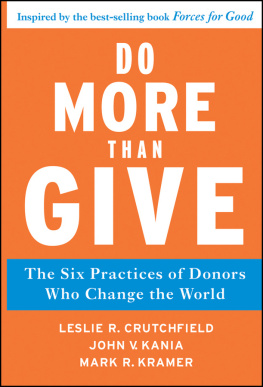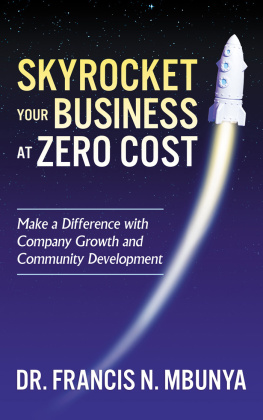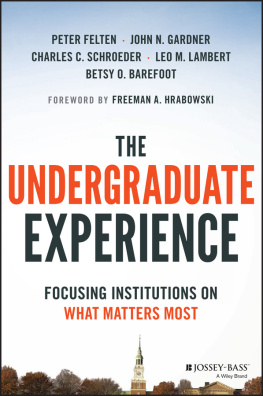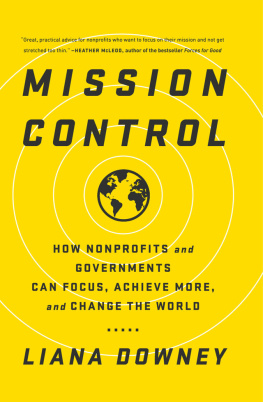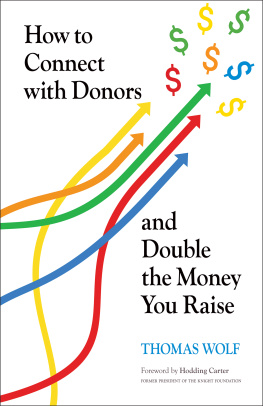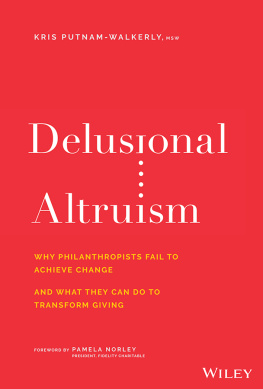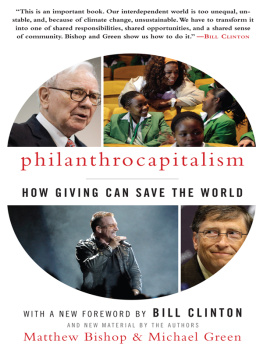Copyright 2011 by Leslie R. Crutchfield and FSG Social Impact Advisors. All rights reserved.
Published by Jossey-Bass
A Wiley Imprint
989 Market Street, San Francisco, CA 94103-1741www.josseybass.com
No part of this publication may be reproduced, stored in a retrieval system, or transmitted in any form or by any means, electronic, mechanical, photocopying, recording, scanning, or otherwise, except as permitted under Section 107 or 108 of the 1976 United States Copyright Act, without either the prior written permission of the publisher, or authorization through payment of the appropriate per-copy fee to the Copyright Clearance Center, Inc., 222 Rosewood Drive, Danvers, MA 01923, 978-750-8400, fax 978-646-8600, or on the Web at www.copyright.com. Requests to the publisher for permission should be addressed to the Permissions Department, John Wiley & Sons, Inc., 111 River Street, Hoboken, NJ 07030, 201-748-6011, fax 201-748-6008, or online at www.wiley.com/go/permissions.
Readers should be aware that Internet Web sites offered as citations and/or sources for further information may have changed or disappeared between the time this was written and when it is read.
Limit of Liability/Disclaimer of Warranty: While the publisher and author have used their best efforts in preparing this book, they make no representations or warranties with respect to the accuracy or completeness of the contents of this book and specifically disclaim any implied warranties of merchantability or fitness for a particular purpose. No warranty may be created or extended by sales representatives or written sales materials. The advice and strategies contained herein may not be suitable for your situation. You should consult with a professional where appropriate. Neither the publisher nor author shall be liable for any loss of profit or any other commercial damages, including but not limited to special, incidental, consequential, or other damages.
Jossey-Bass books and products are available through most bookstores. To contact Jossey-Bass directly call our Customer Care Department within the U.S. at 800-956-7739, outside the U.S. at 317-572-3986, or fax 317-572-4002.
Jossey-Bass also publishes its books in a variety of electronic formats. Some content that appears in print may not be available in electronic books.
Library of Congress Cataloging-in-Publication Data
Crutchfield, Leslie R., 1968
Do more than give : the six practices of donors who change the world / Leslie R. Crutchfield, John V. Kania, and Mark R. Kramer.
p. cm.(J-b us non-franchise leadership ; 390)
Includes bibliographical references and index.
ISBN 978-0-470-89144-5 (hardback)
1. Charities. 2. Charitable uses, trusts, and foundations. 3. Endowments. 4. Fund raising. 5. Social change. I. Kania, John V. II. Kramer, Mark R. III. Title.
HV40.C78 2011
361.7dc222010053644
For Caleigh and Quinn
For Nate, Lucy, and Mia
For Toby, Elizabeth, and Benjamin
Preface
When the three of us joined together to coauthor this book, we each brought different life experiences and professional training to the project. What has united us is our urgency to find ways to make faster progress toward solving the pressing social and environmental problems that persist in the world and our shared belief that philanthropy has much to contribute to those solutions. Although countless books have been written about the difference donors and nonprofits have made in causes both local and globaladvancements in understanding that we applaud and from which we have learnedwe believe that donors can do even more.
For Mark, growing up in a family with a small private foundation awakened him to the idea that philanthropy could do more. He saw how isolated most family foundations were. He observed that much money could be given to hard-working nonprofits year after year with the very best of intentions but without changing much of anything. He often saw foundations that were convinced of their uniqueness and unable to learn from others' experiences. He observed family foundations that were determined to avoid overhead expense and as a result were perpetually short staffed. And he saw foundations that struggled to meet their 5 percent payout requirementin an era when real-world needs were growing and problems were crying out for answers.
This ironythat in the face of such vast need some foundations could barely find ways to make the minimum contribution required to maintain their tax-exempt statuspersuaded Mark that the system just wasn't working. These experiences formed the basis for his lifelong commitment to understanding how philanthropy's performance could be improved. In 1999, he and his friend Michael Porter established the Center for Effective Philanthropy to help define and advance foundation effectiveness, and at the same time they cofounded the consulting firm Foundation Strategy Group (FSG) to work in depth with leaders of foundations to develop and pursue effective strategies for social change. (At its founding in 1999, the consulting firm was called Foundation Strategy Group [FSG]. The firm later officially changed its name to FSG, so later in the book, we refer to it as FSG.) In 2009, Mark crystallized many of the lessons he had learned from his decade of work at FSG in Catalytic Philanthropy, an article published in the Stanford Social Innovation Review ( SSIR ).
When that edition of SSIR landed in her mailbox, Leslie was preparing to write her next book. Her first book, Forces for Good: The Six Practices of High-Impact Nonprofits , coauthored with Heather McLeod Grant, had been released in 2007. During the subsequent three years Leslie had been traveling across the United States and Canada, speaking to groups of nonprofit and philanthropic leaders about how they could achieve better outcomes if they focused on advancing larger causes and leveraging change through each sector of societygovernment, business, nonprofit organizations, and individualsrather than just shoring up their own institutions. She also was advising family foundations on how to increase the impact of their giving. The more Leslie interacted with foundation leaders, the more intrigued she became with the role that philanthropy plays in creatingand sometimes holding backsocial change. So she decided to write a book about applying the practices in Forces for Good to philanthropy.
At first, Leslie thought the best advice she could give donors was to use the six practices of high-impact nonprofits as a screen to guide their giving. If foundations channeled more of their funds to nonprofits that employed cross-sector approaches such as advocating for policy change or partnering with private enterprise to advance social objectives, she reasoned, they could get more bang for their charitable dollar. But she soon realized that just picking great grantees wasn't enough. She knew that donors could do more. They could fund groups that advocate, but donors were also uniquely qualified to engage in advocacy and to raise their voices on behalf of causes. Donors could support nonprofits that partner with business, but they could also leverage their business connections and know-how to advance causes.
Initially, Leslie didn't know of many good examples of this kind of giving. Then she read Mark's article on catalytic philanthropy. This is it! Leslie thought, this is what high-impact philanthropy looks like. Catalytic donors do the same things that the social entrepreneurs in Forces for Good do, they just start with a concentration of wealth rather than raising funds from scratch. So she asked Mark and also FSG managing director John Kania if they would like to team up and collaborate on this book.

